Pre-employment screening helps recruiters find top talent and understand what skills candidates will bring to the company. It's a key step in building high-performing teams.
This guide compares Adaface and Harver, two popular assessment platforms. We'll look at their features and benefits to help you choose the right tool for your hiring needs.
Explore this post with:
Table of contents
How does Adaface work?
Adaface is an AI-powered platform designed to help recruiters assess candidates through tailored, conversational tests. It focuses on making the hiring process more candidate-friendly while providing reliable results.
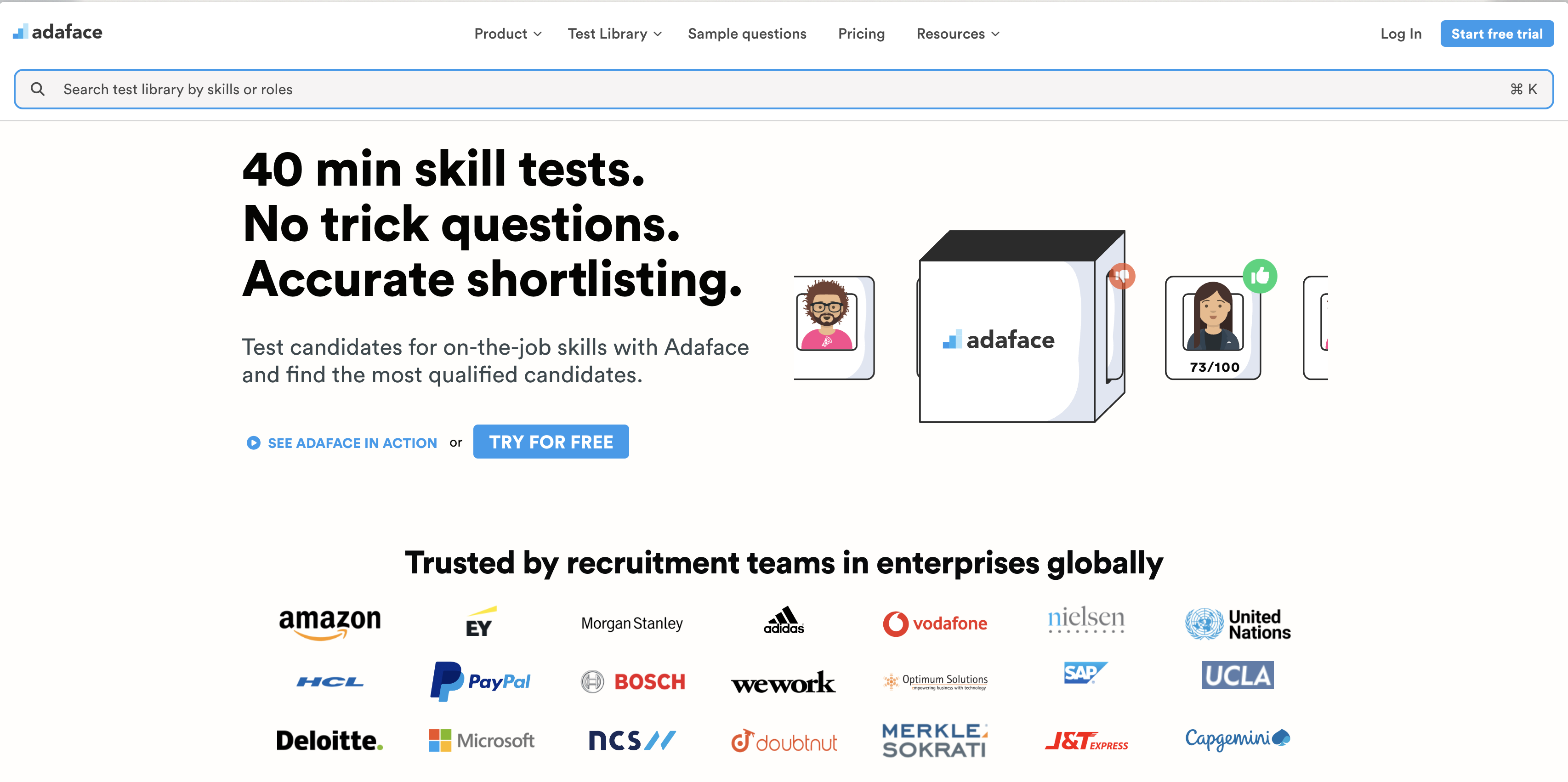
Recruiters use Adaface for its ability to create custom assessments based on job descriptions, ensuring each test is directly relevant to the role. This feature helps in identifying the best-suited candidates more accurately.
Additionally, Adaface offers a library of ready-to-use tests spanning multiple skill areas such as programming, aptitude, and business skills. These tests are designed to evaluate both technical and soft skills, providing a holistic view of each candidate's capabilities.
One standout feature is Adaface's advanced proctoring capabilities, which include browser tracking, webcam monitoring, and IP logging to maintain test integrity. For more details, visit the Adaface Online Assessment Platform and learn about remote proctoring features.
How does Harver work?
Harver is designed to simplify the hiring process with a variety of pre-employment assessments. It aims to offer a holistic view of a candidate's suitability for a role by utilizing multiple testing formats.
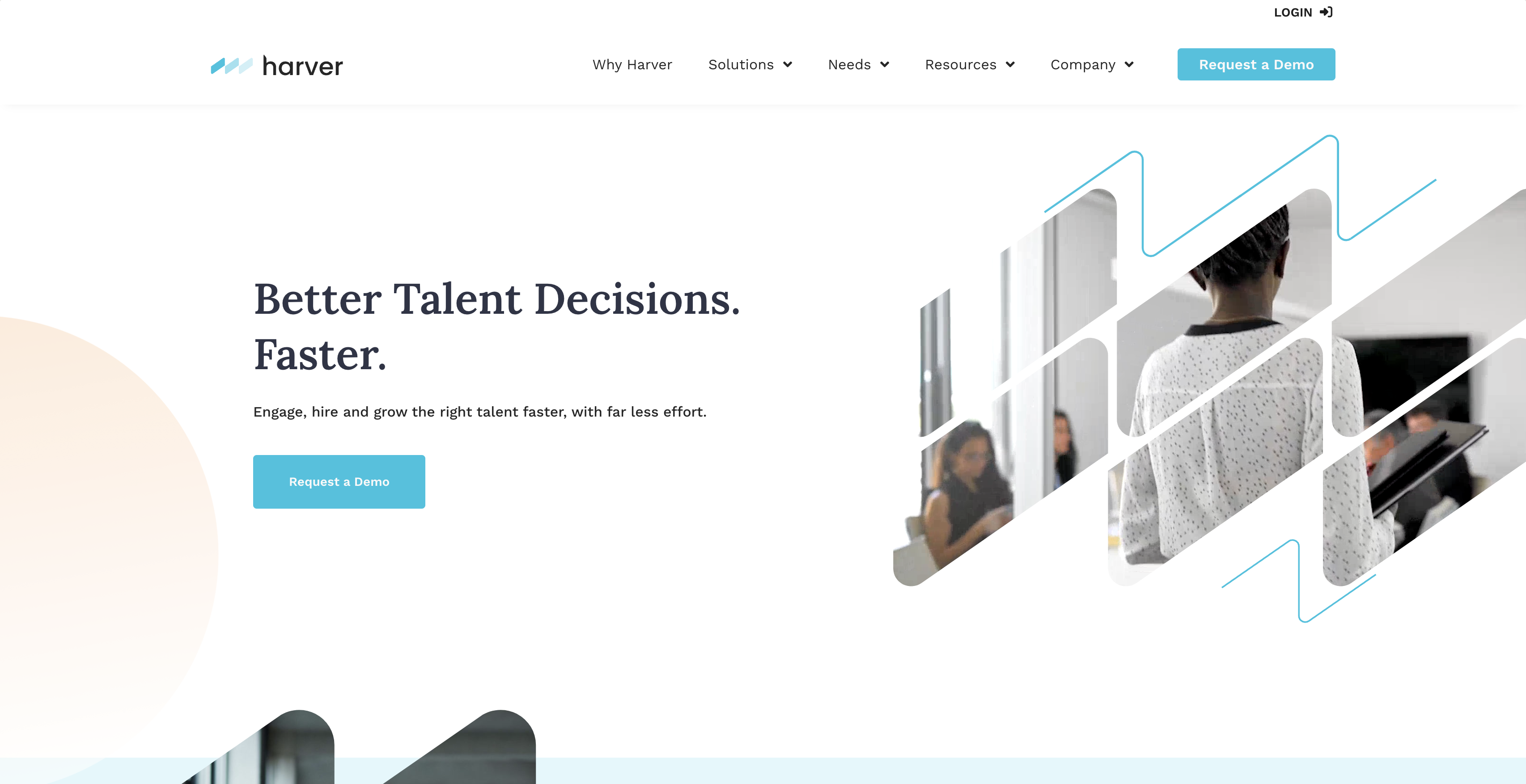
Harver supports aptitude, personality, language, and situational judgment tests. This allows recruiters to evaluate a candidate's cognitive abilities, cultural fit, and specific job-related skills in one platform.
One of Harver's standout features is its situational judgment tests, which simulate real-life job scenarios. These assessments help gauge how candidates might react in typical workplace situations, providing deeper insights into their decision-making skills.
However, Harver lacks support for coding and new technology-specific assessments like AI and cloud computing. This could be a drawback for tech-driven companies looking to comprehensively evaluate a candidate's technical prowess.
Adaface vs Harver: Test libraries
Adaface's test library is a treasure trove of pre-employment assessment tests covering 500+ skills. From programming to personality, it's got tests for every hiring need you can think of.
Harver's test library focuses on aptitude, personality, and situational judgment tests. While it covers some business skills, it lacks in areas like programming and AI.
Adaface's test library
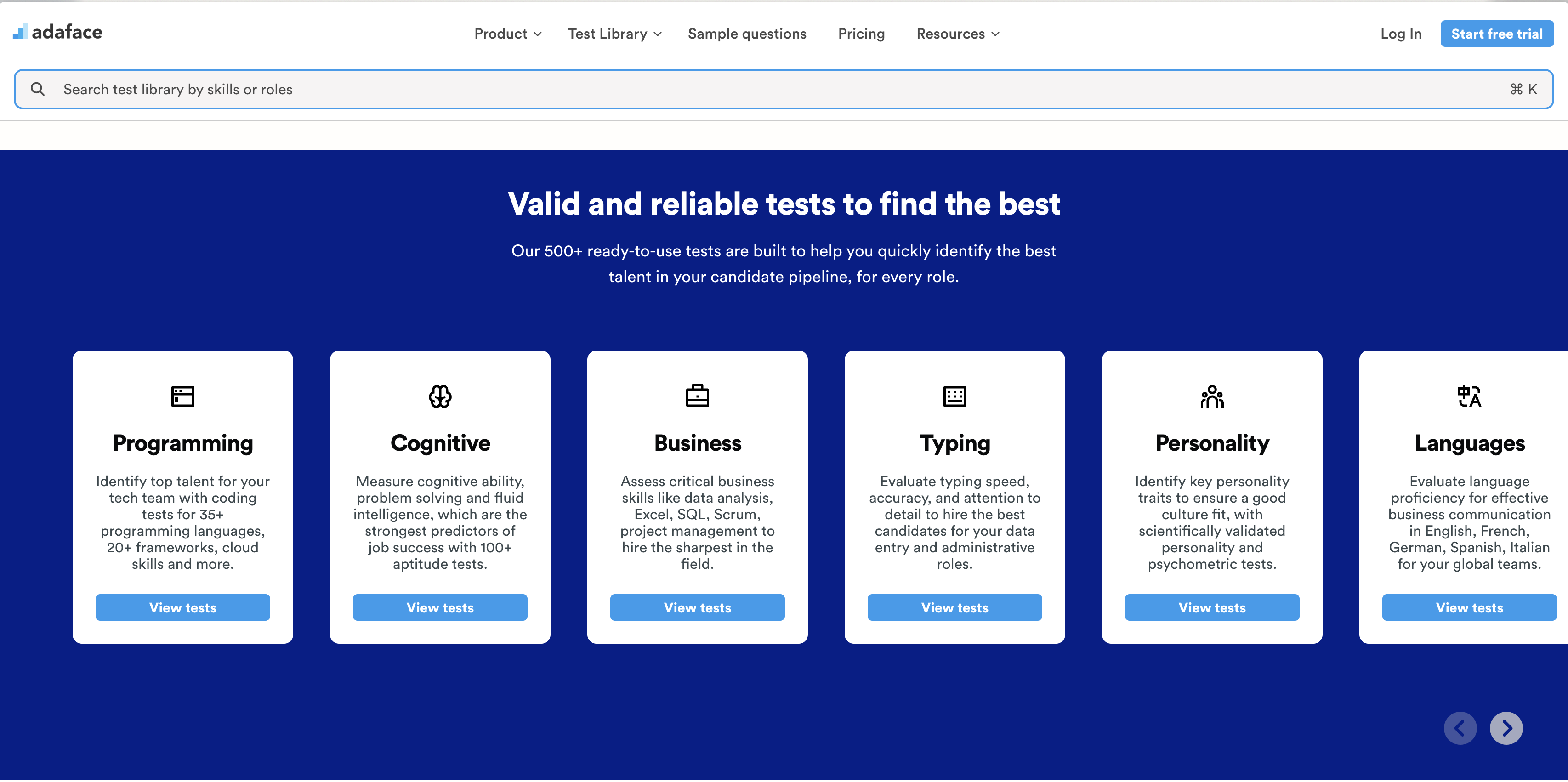
Adaface's library shines with its variety:
- Programming tests (including coding questions)
- Artificial Intelligence tests
- Role-specific tests
- Aptitude, personality, and language tests
- Custom questions option
Recruiters love Adaface's library because it lets them create tailored assessments. They can mix and match tests, add custom questions, and even get tests designed specifically for their job descriptions.
Using Adaface's library is a breeze. Just pick your tests, customize if needed, and voila! You've got a top-notch assessment ready to go. It's like having a master chef's recipe book at your fingertips.
Harver's test library
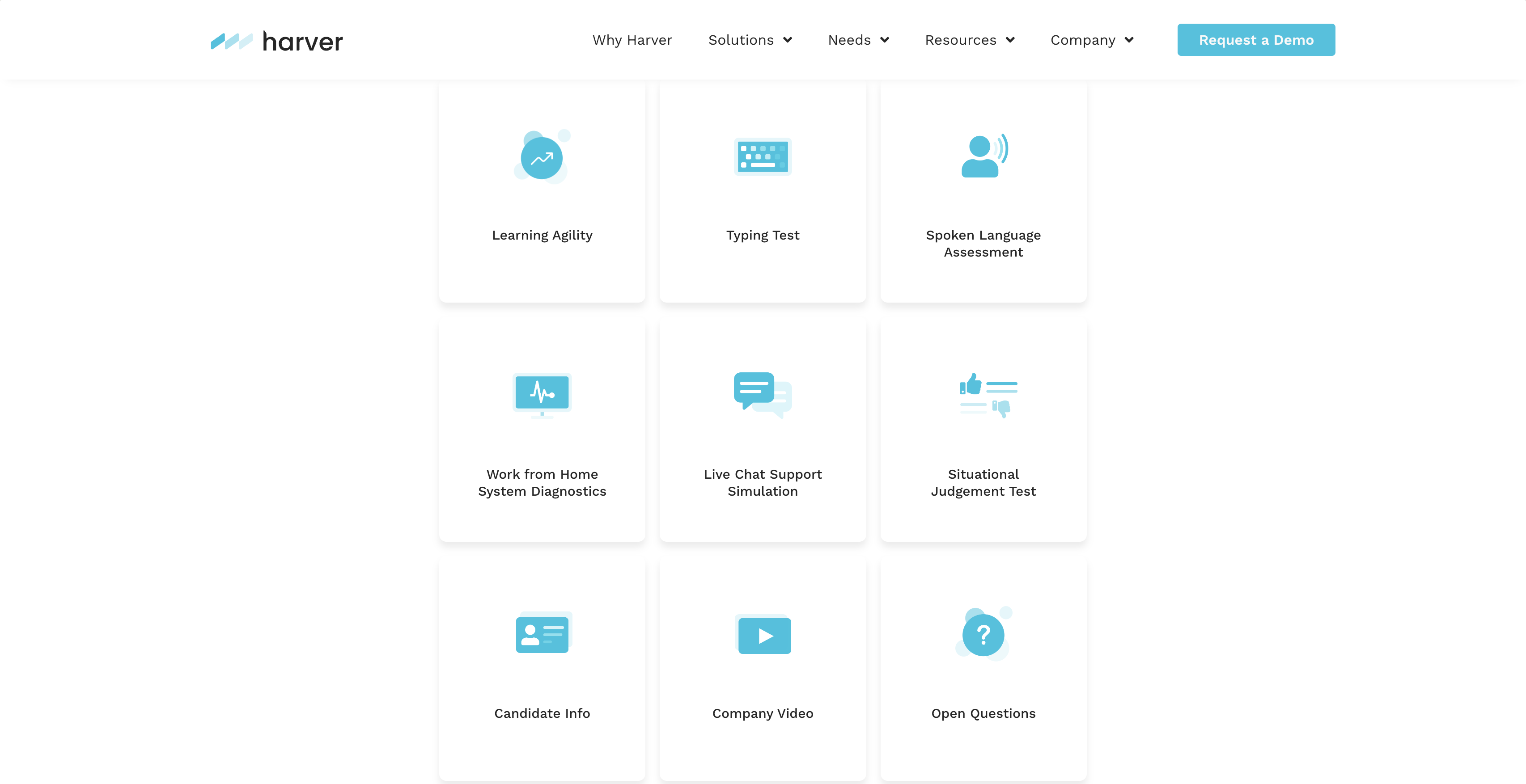
Harver's test library offers a broad array of assessments, including situational judgment, aptitude, business, typing, personality, and language tests. You can also add your own questions to their platform.
This variety can be particularly useful for companies looking to evaluate candidates across different non-technical roles and skill sets, making it versatile for various hiring needs.
However, Harver doesn't provide programming, AI, or cloud tests, which could be limiting for organizations with technical hiring needs.
Comparison of test libraries
Adaface vs Harver: Business, Marketing and Ops Roles
When recruiters are on the hunt for top talent, they're not just seeking any candidate—they're looking for someone with the exact skills that match the job description. This is why they rely heavily on assessments to evaluate candidates' on-the-job role-specific skills before making hiring decisions.
Both Adaface and Harver offer functionalities to screen candidates for these skills. While Harver covers a range of test types, Adaface shines with its extensive test library, offering targeted solutions from programming to role-specific tests.
Business, Marketing and Ops Roles with Adaface
Adaface excels in testing on-the-job role-specific skills with its diverse range of functionalities:
- Broad Test Library: Over 500 tests including Microsoft Excel, aptitude, and personality tests.
- Customizable Tests: Tailored tests for specific job descriptions.
- Scenario-Based MCQs: Real-world scenarios to gauge practical knowledge.
Recruiters love Adaface for its ability to craft tests that mirror the real challenges candidates will face on the job. For example, the scenario-based questions in the Digital Marketing and Git tests provide insights into a candidate's practical skills.
Additionally, Adaface supports the creation of custom questions, allowing recruiters to adapt assessments to fit unique needs. With the Pre-Employment Assessment Test Library at their disposal, recruiters can effortlessly identify candidates who are the perfect fit for specific roles.
Hiring Business, Marketing and Ops Roles with Harver
Harver offers a solid suite of assessments tailored for non-developer roles, providing situational judgment tests, aptitude tests, and business skills evaluations. This variety allows organizations to evaluate candidates across multiple dimensions relevant to their operational needs.
The standout feature of Harver's test library is its range of ready-to-use assessments for functions like sales, marketing, and project management. This enables hiring managers to quickly gauge candidate suitability for specific roles without getting bogged down in the test creation process.
However, Harver lacks the ability to customize assessments based on unique job descriptions, which might leave gaps in evaluating candidates for nuanced, role-specific skills. This could mean that some candidates may not be accurately assessed against the precise requirements of the job.
Adaface vs Harver: Developer hiring
Recruiters use tests to screen developers to ensure candidates possess the required technical skills before moving forward in the hiring process.
Both Adaface and Harver offer a variety of tests to evaluate developer skills, though their offerings differ significantly.
Hiring developers with Adaface
Adaface's platform provides a rich array of functionalities for hiring developers, including coding challenges, MCQs, and customizable tests that cover numerous programming languages and frameworks.
In contrast, Harver lacks several key functionalities like web and mobile framework questions, SQL coding assessments, and automated scoring, which can make developer evaluation less comprehensive.
Adaface's functionalities for hiring developers include:
- Programming language coding questions
- Web and mobile framework questions
- SQL coding questions
- Data Structures and Algorithm questions
- Code playback
- Automated scoring
- Custom coding questions
Recruiters use Adaface to hire developers because it offers both coding and multiple-choice questions, allowing for a balanced evaluation of hands-on skills and theoretical knowledge. This includes Java and Python tests, ensuring comprehensive developer assessment.
Additionally, the timeline code playback feature allows recruiters to review a candidate's coding process in detail. This adds transparency and accuracy to the evaluation, making Adaface a preferred choice for developer hiring.
Hiring developers with Harver
Harver doesn't offer programming assessments or coding tests as part of its platform. Their focus is primarily on pre-employment testing for soft skills, cognitive abilities, and personality traits.
While Harver excels in assessing general work-related competencies, it lacks specialized tools for evaluating technical skills specific to software development roles. This limitation may impact its effectiveness for companies looking to hire developers or other technical positions.
The absence of coding questions, algorithm challenges, or framework-specific assessments in Harver's offerings could make it challenging for recruiters to gauge a candidate's practical programming abilities or problem-solving skills in a development context.
Comparison of developer hiring features
Adaface vs Harver: Candidate experience and company branding
Creating a positive candidate experience is like giving each applicant a warm hug and a cookie after their test. When candidates feel comfortable, they're more likely to complete assessments and regard your company positively.
Look for features that enhance ease of use, such as mobile compatibility, conversational interfaces, and customizable communications. These aspects can significantly improve the candidate's impression of your brand, making them more likely to engage with your recruitment process.
Candidate experience and company branding with Adaface
Adaface stands out with its conversational interface, which transforms assessments into engaging dialogues rather than cold tests. This friendly approach boosts completion rates, as candidates feel more connected during their evaluations.
Mobile-friendliness is another feature that makes Adaface shine brighter. With candidates able to take assessments on the go, they’re less likely to abandon tests midway, giving you a better chance to evaluate their skills accurately.
Lastly, Adaface lets you customize invitation and rejection templates, ensuring your communication reflects your company's voice. This alignment reinforces your brand identity throughout the hiring journey and shows that you care about building meaningful connections with candidates.
Candidate experience and company branding with Harver
Harver focuses on creating a smooth candidate experience, allowing applicants to complete assessments without the hassle of complex interfaces. However, their lack of mobile support and conversational assessments can make the testing feel a bit like a chore instead of an engaging process.
For company branding, Harver does allow businesses to showcase their logo and customize invitation templates. Yet, candidates experience the platform's branding rather than a personalized touch from the hiring company, which could diminish the brand's presence during the assessment process.
A strong candidate experience paired with effective company branding can set businesses apart in a competitive job market. Recruiters need platforms that not only present their brand well but also make candidates feel valued and engaged throughout the hiring journey.
While Harver offers some branding options, it lacks the ability to customize the candidate interface fully. This can result in a disconnect between the company's branding and the overall candidate experience, which is something savvy recruiters will want to consider.
Adaface vs Harver: Anti-cheating features
In a world where online assessments are becoming the norm, anti-cheating features are a must for maintaining the integrity of your hiring process. Effective proctoring ensures that you're evaluating the right person and that their skills reflect their true abilities. Let's dive into how Adaface excels in this area.
Anti-cheating features of Adaface
Adaface goes above and beyond in providing top-notch anti-cheating features. These include:
- Non-googleable questions that are scenario-based.
- Web proctoring to track browser tabs and windows.
- Webcam proctoring to ensure the candidate is present throughout the test.
- Location logging and IP proctoring to track where and how the test is taken.
- Device Fingerprint proctoring to detect if two candidates use the same device.
- Copy paste protection, full screen proctoring, and Chat GPT protection.
- Multiple question sets and a large 20K question bank.
- Plagiarism detection and social listening for task leaks.
In addition to these robust features, Adaface also ensures test integrity by hiding questions and answers, only revealing them to recruiters when necessary. This maintains the security of the test content while still providing recruiters with the information they need. The platform also logs multiple metrics to help identify if any suspicious activities occurred during the test.
To learn more about how Adaface enhances its remote proctoring capabilities, you can read Ensure accurate assessments with remote proctoring features. Additionally, for a deeper dive into online proctoring, check out Everything you should know about online proctoring.
Anti-cheating features of Harver
Harver offers some basic anti-cheating features such as time limits for tests and user authentication, which helps ensure that the correct candidate is taking the test.
These features are particularly useful for scenarios where the integrity of the test duration is important, and where knowing the genuine identity of the test taker is critical.
However, Harver lacks several advanced proctoring tools. There is no webcam monitoring, IP logging, or copy-paste protection, which leaves gaps that could potentially be exploited for cheating.
Comparison of anti-cheating features
Adaface vs Harver: Pricing and free trial
When it comes to pricing for pre-employment assessment tools, recruiters should look for transparency and flexibility. The best platforms offer clear pricing structures that cater to various hiring needs, from small teams to large enterprises.
Adaface pricing
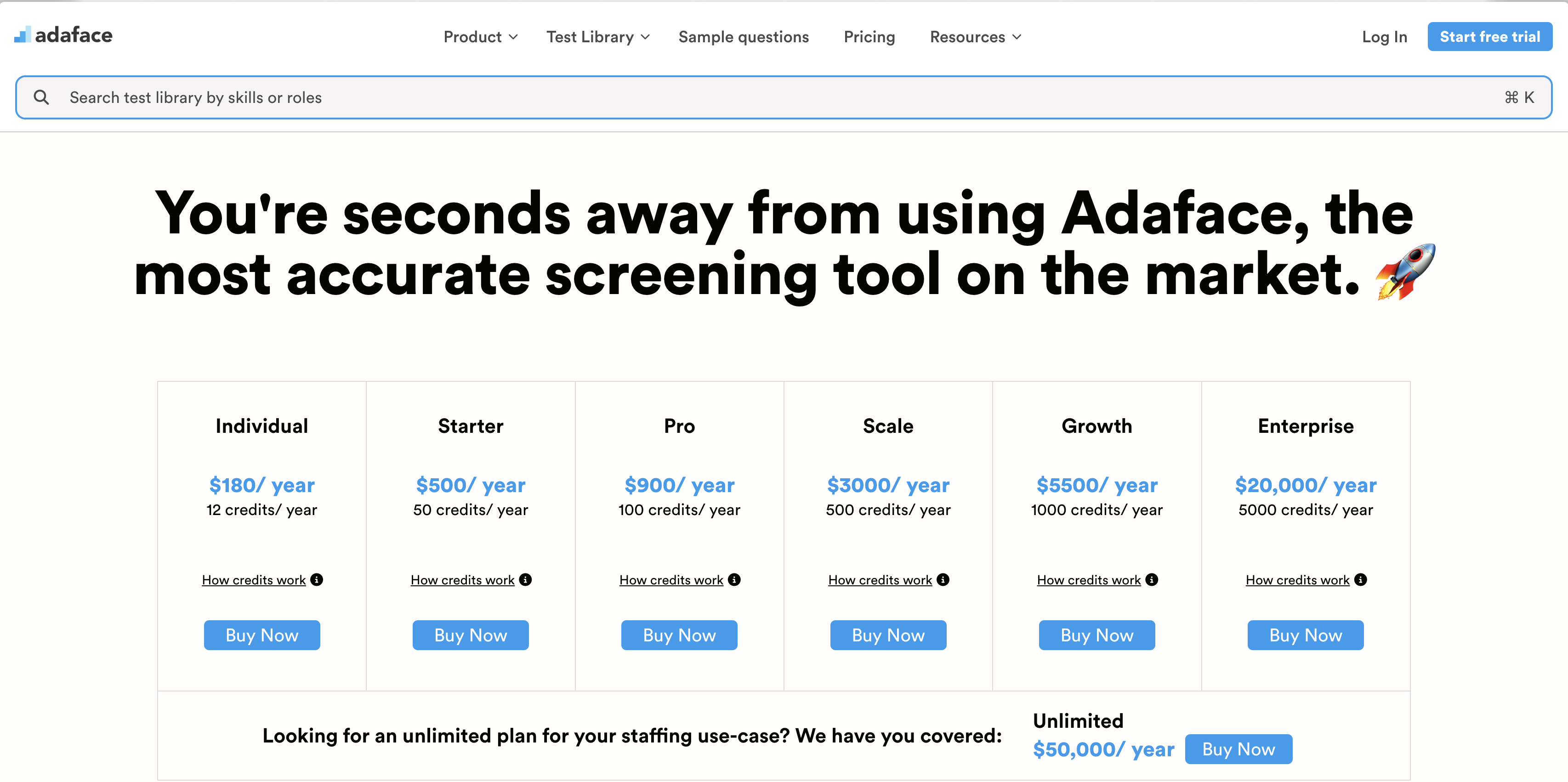
At Adaface, we believe in making our pricing straightforward and accessible. Our pricing page provides all the details you need, so you can easily choose the plan that fits your requirements without having to jump on a sales call.
We offer a range of plans to suit different hiring scales:
- Starter: $500 for 50 credits
- Scale: $3,000 for 500 credits
- Growth: $5,500 for 1,000 credits
- Enterprise: $20,000 for 4,000 credits
- Unlimited: $50,000 per year for unlimited assessments
Our pricing model is designed to grow with your company. Whether you're a startup making your first hires or a large corporation with ongoing recruitment needs, we have a plan that's right for you. Plus, we offer a free trial so you can explore all our features before making a decision.
Harver pricing
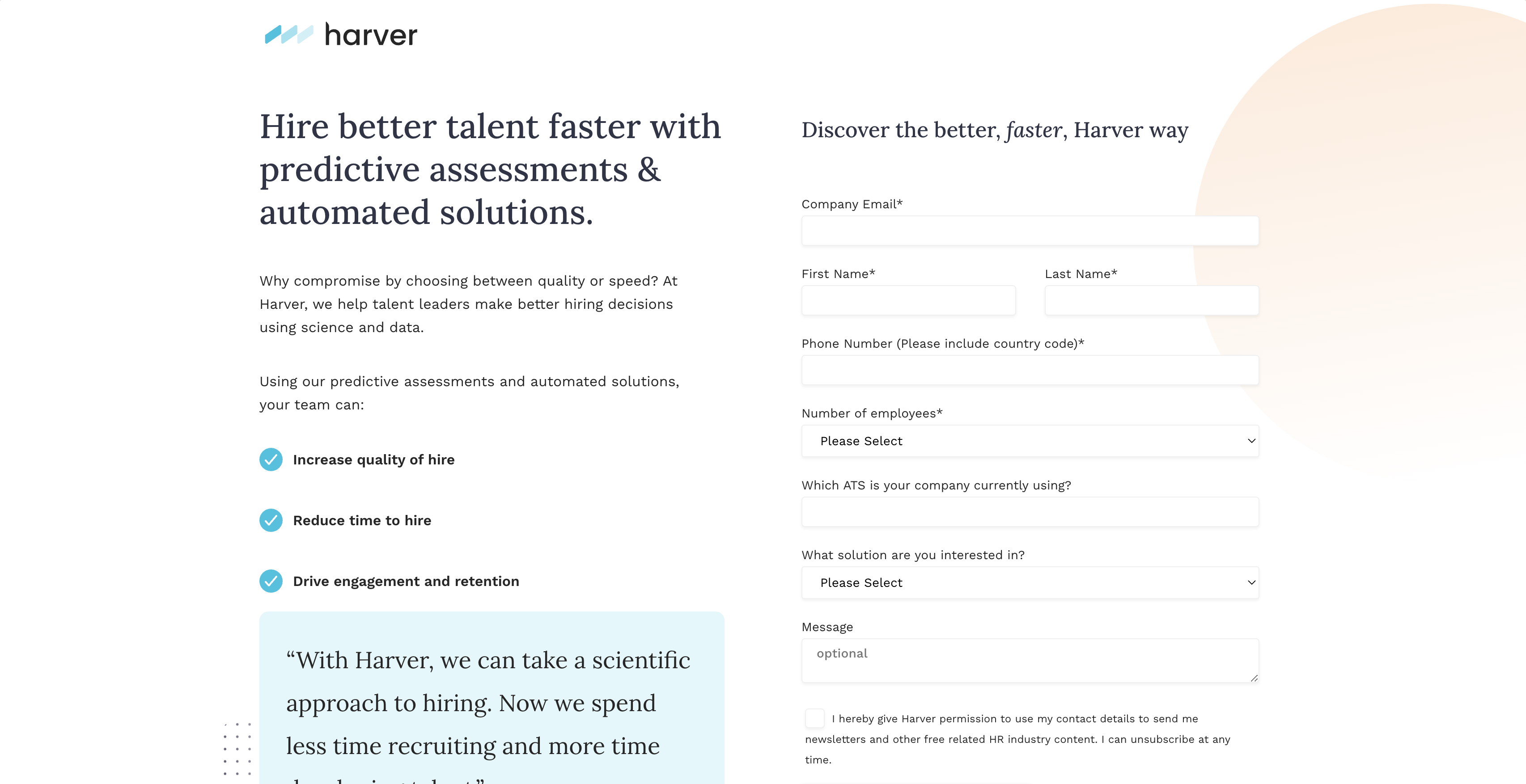
Harver's pricing information is not publicly available on their website. This means potential customers need to contact Harver directly for a quote. While this approach allows for customized pricing based on specific needs, it can make it challenging for companies to quickly compare costs with other assessment providers. Harver likely offers different plans tailored to various company sizes and hiring needs, but without transparent pricing, it's difficult to know what to expect in terms of cost.
The lack of public pricing information and a free trial option may make it harder for recruiters to evaluate Harver's platform before committing. Companies often prefer to explore features and test the user experience before making a purchasing decision. Additionally, the absence of a self-service sign-up process means that interested parties can't immediately access the platform, potentially slowing down the decision-making process for time-sensitive hiring needs.
Comparison of pricing
Adaface vs Harver: Scorecards, reporting and analytics
When it comes to scorecards, reporting, and analytics, an ideal assessment platform should allow recruiters to easily track candidate performance and share insights with their team. Detailed, user-friendly reports not only enhance decision-making but also streamline communication across teams, making hiring smoother and smarter.
Adaface scorecards, reporting and analytics
Adaface shines with its automated scorecard generation, ensuring you get instant reports right after a candidate completes their assessment. This means no more waiting around; you’re always in the loop about candidate performance. Plus, the detailed audit timeline helps track all proctoring logs, giving you a complete picture of the assessment process.
With features like skill-wise analysis, Adaface allows recruiters to see exactly where each candidate excels or needs improvement. This breakdown gives you targeted insights, helping you make informed decisions on whom to move forward in the hiring process. What's cooler? You can view a candidate's skills profile through a radar chart, comparing their scores against industry benchmarks and company averages.
If you're curious to see how these scorecards look, check out our variety of sample scorecards here. Each one is designed to make your evaluation process a breeze.
Harver scorecards, reporting and analytics
Harver offers a range of reporting and analytics features for recruiters. Their platform generates PDF reports and provides Excel and CSV exports for candidate data analysis. Harver also includes benchmarking capabilities to compare candidates against the overall pool.
The platform creates a skills profile for each candidate, giving recruiters a quick overview of performance across different areas. Harver's comprehensive overview allows recruiters to compare multiple candidates at once, streamlining the decision-making process.
While Harver provides useful reporting tools, it's unclear if they offer public report sharing or detailed skill-wise analysis. The platform also doesn't seem to include an audit timeline for proctoring logs, which some recruiters might find helpful for thorough candidate evaluation.
Comparison of scorecards, reporting and analytics
Adaface vs Harver: Enterprise and startup friendliness
When choosing a skills assessment platform, look for features that work for companies of all sizes. The best tools offer ATS integration, API access, and GDPR compliance to support growing businesses.
Adaface's enterprise and startup friendliness
Adaface integrates with popular ATS systems, making it easy to use at scale. Its open API allows for custom integrations and workflows. Plus, Adaface is GDPR compliant to keep enterprises on the right side of data laws.
For high-volume hiring, Adaface provides bulk actions and multiple invite options. This streamlines processes like campus recruiting. Adaface also offers multiple question sets, so you always have fresh tests ready.
Adaface caters to both startups and enterprises with unlimited team seats and role-based access. For extra peace of mind, enterprise users can opt for custom data storage locations and priority support. These features help Adaface stand out as a top choice for pre-employment testing.
Harver's enterprise and startup friendliness
Harver caters to both enterprises and startups with features like ATS integrations and role-based access, ensuring smooth candidate assessments and management. Their platform is GDPR compliant, which is a big plus for companies worried about data privacy.
For instance, an enterprise can streamline its hiring process by inviting candidates through multiple channels, making it easier to manage large volumes of applicants. This flexibility allows teams to focus on what really matters: finding the right talent.
However, companies looking for a more personalized touch may find Harver's lack of a public API limiting. This could hinder custom integrations that many businesses seek to enhance their hiring workflows.
Comparison of enterprise and startup friendliness
Adaface vs Harver: Customer support
Adaface vs Harver: Customer support is a key factor in assessment platforms. Recruiters need to ensure they can get help whenever they run into questions or issues, as it directly impacts their hiring process.
Adaface's customer support features
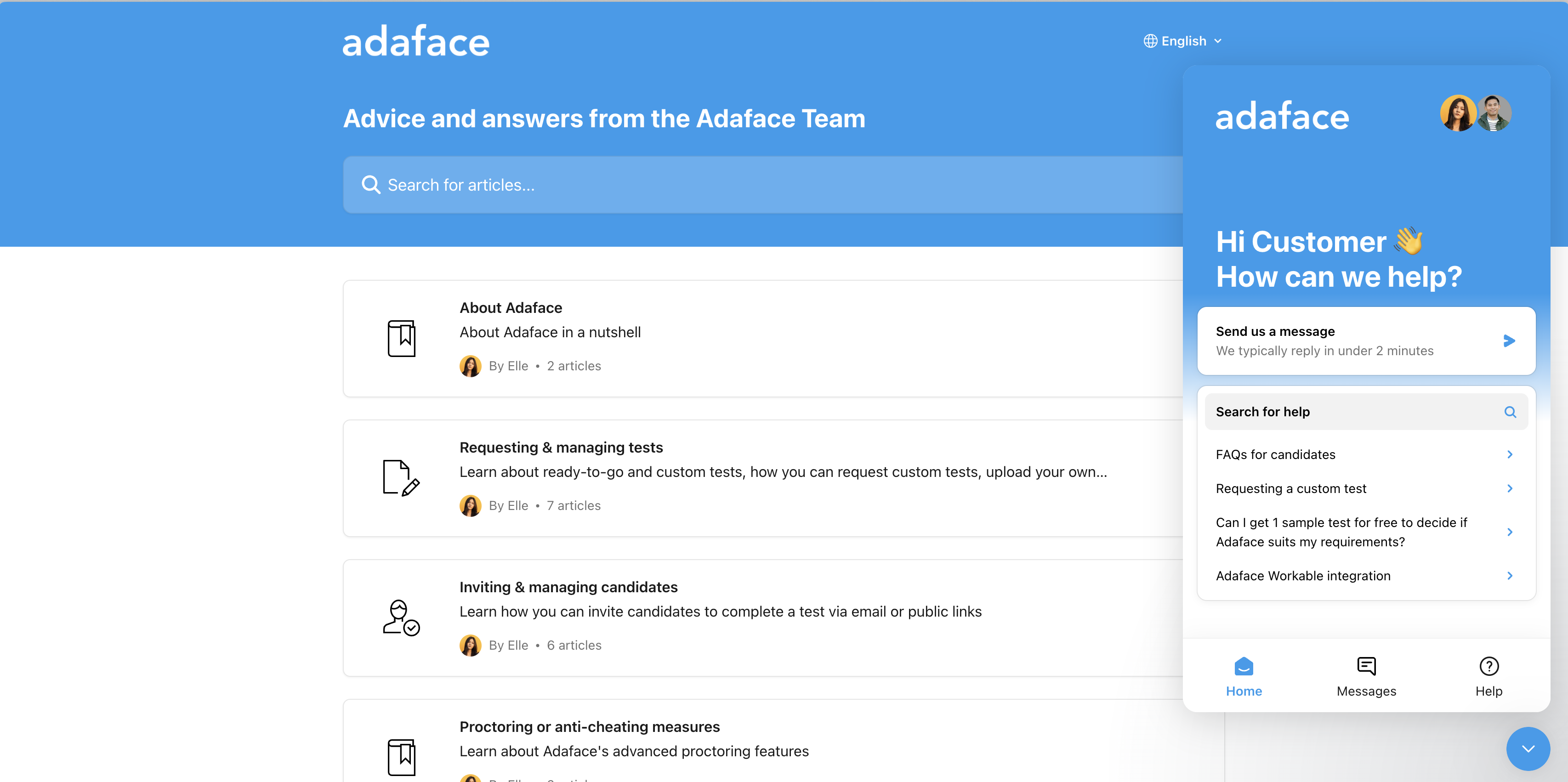
Adaface shines with multiple support channels, including email and live chat, ensuring that help is just a message away. Plus, there's a dedicated help center filled with resources to guide recruiters through common queries and features.
For those on higher plans, Adaface provides dedicated priority support, ensuring that enterprises have a direct line for issue resolution. New users also benefit from training and onboarding sessions to get them up and running quickly.
With these features, recruiters can easily navigate the platform and focus on finding the right candidates. Interested in how to enhance your hiring process? Check out our how to hire guides or explore the Adaface product tour.
Harver's customer support features
Harver provides customer support through email and offers a help center with articles and FAQs. They do not have live chat support or phone assistance for immediate queries.
There is no training and onboarding support available, and information on dedicated priority support is not clear. Users seeking quick resolutions or personalized assistance might find these areas lacking.
Comparison of customer support
Adaface vs Harver: Final verdict
Both Adaface and Harver offer a variety of tests covering job skills and employee traits. They aim to make hiring more objective and reduce bias in the recruitment process.
Adaface stands out with its larger test library and more customization options. It offers coding tests and technical assessments that Harver doesn't provide.
Adaface also allows shorter, 40-minute tests. This improves completion rates while still thoroughly evaluating candidates. Harver's tests tend to be longer.
Streamline hiring with skill tests
A unique Adaface feature is its conversational interface, which creates a more engaging candidate experience. Harver uses a traditional test format.
Pre-employment assessments help you evaluate culture fit, personality, cognitive ability, and job-specific skills. This gives a complete picture of each applicant.
These tools save time by quickly comparing candidates objectively, without needing to review stacks of resumes manually.
Adaface offers the flexibility to assess candidates for almost any role across industries. To learn more, check out our plans or try our free trial to see how Adaface could improve your hiring process.
Adaface vs Harver FAQs
Adaface offers a wide range of tests including programming, aptitude, business, language, and AI tests.
Harver does not offer programming tests, whereas Adaface provides robust support for coding and scenario-based MCQs.
Yes, Adaface allows you to create custom questions and tests tailored to specific job descriptions.
No, Harver's platform is not mobile-friendly, but Adaface supports mobile for most assessments.
Adaface offers comprehensive proctoring features including web and webcam proctoring, which are essential for maintaining test integrity.
Adaface offers a free trial so recruiters can explore its features, whereas Harver does not provide a free trial.

40 min skill tests.
No trick questions.
Accurate shortlisting.
We make it easy for you to find the best candidates in your pipeline with a 40 min skills test.
Try for freeRelated posts



